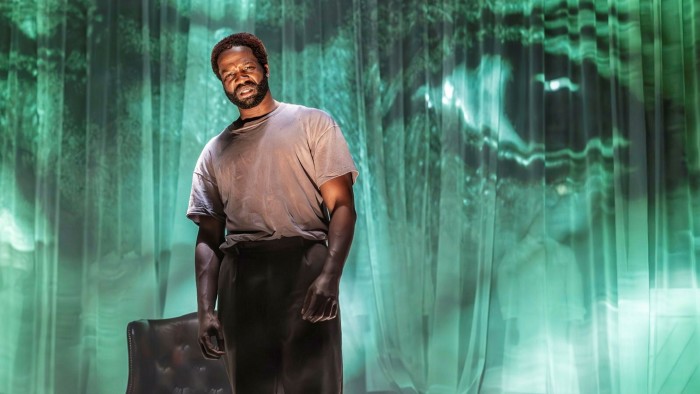Unlock the Editor’s Digest for free
Roula Khalaf, Editor of the FT, selects her favourite stories in this weekly newsletter.
How to find a theatrical style that measures up to the unthinkable? Like other writers of his time, Eugène Ionesco reached for absurdism. Rhinoceros, written in 1959 and newly revived at London’s Almeida Theatre, is a case study in the ease with which a community adopts a herd mentality. But the Romanian-French playwright doesn’t make his point by earnestly depicting the creeping grip of an ideology, such as fascism or apartheid. Rather, he gives us a surreal comedy. Here the residents of a small French town gradually turn into rhinoceroses, with just one man, Berenger, watching on in horror and disbelief.
It’s an approach that makes the play flex to fit the occasion, whether that be 1940s France, 1950s Russia — or somewhere closer to home. Meanwhile, the ridiculousness of the story creeps up on you, switching stealthily from absurdity to horror. It doesn’t take too much work to guess why Omar Elerian might have decided to direct it now.
Elerian expands the theme of conformism, weaving theatrical convention into the mix. Here events unfold in what looks like a community hall pressed into service for a scientific display; they are presided over by Paul Hunter’s “provocateur”, an impish, crazily coiffured individual in a white coat, part mad scientist, part ringmaster. He skips about the stage, offering commentary and footnotes on Ionesco’s play, and makes dark asides about its relevance today. He also co-opts the audience into producing gestures and rhino sounds (using kazoos), neatly demonstrating how easy it is to go along with the crowd.
Around him, a fine physical comedy ensemble, also in white coats, construct the play, acting out stage directions, producing sound effects from two Foley desks at the sides of the stage and taking on multiple roles with exaggerated solemnity. Only Sopé Dìrísù’s excellent Berenger remains apart, bewildered by the rituals conducted around him and by his own role in this increasingly bizarre and nightmarish spectacle.
It’s a treat to watch an actor such as Hayley Carmichael bring her considerable comic skill to playing first an outraged grocer and then a weeping wife whose husband has metamorphosed into a rhino, or to see Anoushka Lucas put her gorgeous singing voice to use by launching into a beautiful but completely incongruous Italian song.
However, the buffoonery also extends what is already quite a long fable, and there are too many passages where you feel you are admiring the skill rather than caught up in the story. The style dilutes the horror: the chill in watching extremism become the norm, in seeing a town so sleepily boring in the clutches of sinister change.
What’s not in doubt is Dìrísù’s performance as Berenger. Always an arresting actor, here he becomes desolate, a man doubting his own mind and conscience, desperately clawing at his features in fear of finding a patch of hide or the beginnings of a horn. And the show ends powerfully. As the rest of the cast smile and bow to the applauding audience, only he, our everyman, remains trapped in the story, declaring his resistance with increasing desperation.
★★★☆☆
To April 26, almeida.co.uk
Read the full article here

